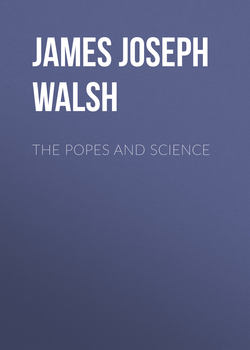Читать книгу The Popes and Science - James Joseph Walsh - Страница 2
PREFACE
ОглавлениеFor years, as a student and physician, I listened to remarks from teachers and professional friends as to the opposition of the Popes to science, until finally, much against my will, I came to believe that there had been many Papal documents issued, which intentionally or otherwise hampered the progress of science. Interest in the history of medicine led me to investigate the subject for myself. To my surprise, I found that the supposed Papal opposition to science was practically all founded on an exaggeration of the significance of the Galileo incident. As a matter of history, the Popes were as liberal patrons of science as of art. In the Renaissance period, when their patronage of Raphael and Michel Angelo and other great artists did so much for art, similar relations to Columbus, Eustachius, and Caesalpinus, and later to Steno and Malpighi, our greatest medical discoverers, had like results for science. The Papal Medical School was for centuries the greatest medical school in Europe, and its professors were the most distinguished medical scientists of the time. This is a perfectly simple bit of history that anyone may find for himself in any reliable history of medicine. The medical schools were the scientific departments of the universities practically down to the nineteenth century. In them were studied botany, zoology and the biological sciences generally, chemistry, physics, mineralogy and even astronomy, because of the belief that the stars influenced human constitutions. The Popes in fostering medical schools (there were four of them in the Papal dominions, and two of them, Bologna and Rome, were the greatest medical schools for several centuries) were acting as wise and beneficent patrons of science. Many of the greatest scientists of the Middle Ages were clergymen. Some of the greatest of them were canonized as saints. Albertus Magnus and Thomas Aquinas are typical examples. At least one Pope had been a distinguished scientist before being elected to the Papacy. For seven centuries the Popes selected as their physicians the greatest medical scientists of the {vi} time, and the list of Papal physicians is the worthiest series of names connected by any bond in the history of medicine, far surpassing in scientific import even the roll of the faculty of any medical school.
In a word, I failed to find any trace of Papal opposition to true science in any form. On the contrary, I found abundant evidence of their having been just as liberal and judicious patrons of science as they were of art and education in all forms. I found also that those who write most emphatically about Papal opposition to science, know nothing at all of the history of science, and above all of medicine and of surgery, during three very precious centuries. Because they know nothing about it they think there was none, and go out of their way to find a reason for its absence, while all the time there is a wondrous series of chapters of science for those who care to look for them. This is the story that I have tried to tell in this book.
This material is, I think, gathered into compact form for the first time. No one knows better than I do how many defects are probably in the volume. What I have tried to do is to present a large subject in a popular way, and at the same time with such references to readily available authorities as would make the collection of further information comparatively easy. I am sorry that the book has had to take on a controversial tone. No one feels more than I do that controversy seldom advances truth. There are certain false notions, however, which have the prestige of prominent names behind them, which simply must be flatly contradicted. I did not seek the controversy, for when I began to publish the original documents in the subject I mentioned no names. Controversy was forced on me, but not until I had made it a point to meet and spend many pleasant hours with the writer whose statements I must impugn, because they so flagrantly contradict the simple facts of medical history.
